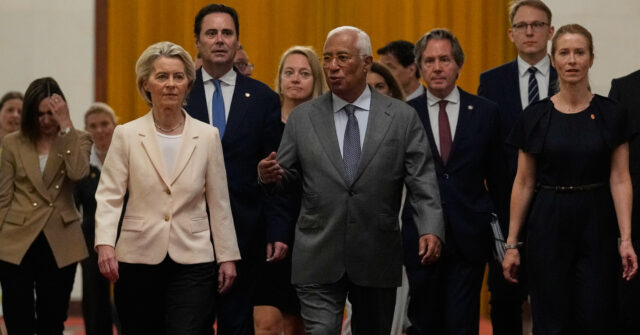BEIJING (AP) – European leaders demanded a more balanced relationship with China at a summit with President Xi Jinping in the Chinese capital on Thursday.
They highlighted trade in their opening remarks, calling for concrete progress to address Europe’s yawning trade deficit with China.
“As our cooperation has deepened, so have the imbalances,” European Commission President Ursula von der Leyen said. “We have reached an inflection point. Rebalancing our bilateral relation is essential. Because to be sustainable, relations need to be mutually beneficial.”
Expectations were low ahead of the talks, initially supposed to last two days but scaled back to one. They come amid financial uncertainty around the world, wars in the Middle East and Ukraine, and the threat of U.S. tariffs. Neither the EU nor China is likely to budge on key issues dividing the two economic juggernauts.
European Council President António Costa called on China to use its influence over Russia to bring an end to the war in Ukraine – a long-running plea from European leaders that is likely to fall again on deaf ears.
Costa signaled a possible agreement on climate, saying he looks forward to “a strong joint political message” from the summit ahead of annual U.N. climate talks in November in Brazil. That message could follow their talks with China’s Premier Li Qiang later Thursday.
Xi called for deeper cooperation between China and Europe to provide stability in an increasingly complex world. Both sides should set aside differences and seek common ground, he said, a phrase he often uses in relationships like the one with the EU.
China is willing to strengthen coordination on climate and make greater contributions to addressing climate change, he said. The Chinese leader pushed back against EU restrictions on Chinese exports.
“We hope the EU will keep its trade and investment markets open, refrain from using restrictive economic and trade tools and provide a good business environment for Chinese companies to invest and develop in Europe,” he said, according to a readout posted online by state broadcaster CCTV.
Besides trade and the Ukraine war, Von der Leyen and Costa were expected to raise concerns about Chinese cyberattacks and espionage, its restrictions on the export of rare earth minerals and its human rights record in Tibet, Hong Kong and Xinjiang.
The EU, meanwhile, has concerns about a looming trade battle with the United States.
“Europe is being very careful not to antagonize President Trump even further by looking maybe too close to China, so all of that doesn´t make this summit easier,” said Fabian Zuleeg, chief economist of the European Policy Center. “It will be very hard to achieve something concrete.”
China’s stance has hardened on the EU, despite a few olive branches, like the suspension of sanctions on European lawmakers who criticized Beijing’s human rights record in Xinjiang, a region in northwestern China home to the Uyghurs.
China believes it has successfully weathered the U.S. tariffs storm because of its aggressive posture, said Noah Barkin, an analyst at the Rhodium Group think tank. Barkin said Beijing thinks the bold tactics that worked with Washington should work with other Western powers.
“China has come away emboldened from its trade confrontation with Trump. That has reduced its appetite for making concessions to the EU,” he said. “Now that Trump has backed down, China sees less of a need to woo Europe.”
Like the U.S., the 27-nation EU bloc runs a massive trade deficit with China – around 300 billion euros ($350 million) last year. It relies heavily on China for critical minerals and the magnets made from them for cars and appliances. When China curtailed the export of those products in response to U.S. President Donald Trump’s tariffs, European automakers cried foul.
The EU has imposed tariffs on Chinese electric vehicles to support its carmakers by balancing out Beijing’s heavy auto subsidies. China would like those tariffs revoked.
The rapid growth in China´s market share in Europe has sparked concern that Chinese cars will eventually threaten the EU´s ability to produce its own green technology to combat climate change. Business groups and unions also fear that the jobs of 2.5 million auto industry workers could be put in jeopardy, as well those of 10.3 million more people whose employment depends indirectly on EV production.
China has launched investigations into European pork and dairy products, and placed tariffs on French cognac and armagnac. It has criticized new EU regulations of medical equipment sales and fears upcoming legislation that could further target Chinese industries, said Alicia García-Herrero, a China analyst at the Bruegel think tank.
The EU has leverage because China needs to sell goods to the bloc, García-Herrero said. “The EU remains China’s largest export market, so China has every intention to keep it this way, especially given the pressure coming from the U.S.,” she said.
China bristles at EU sanctions over Russia’s war against Ukraine. The latest package included two included two Chinese banks that the EU accused of being linked to Russia´s war industry.
China´s Commerce Ministry protested the listing and vowed to respond with “necessary measures to resolutely safeguard the legitimate rights and interests of Chinese enterprises and financial institutions.”
Buffeted between a combative Washington and a hardline Beijing, the EU has more publicly sought new alliances elsewhere, inking a trade pact with Indonesia and drafting trade deals with South America and Mexico.
Costa and Von der Leyen visited Tokyo the day before their meetings in Beijing, launching an alliance with Japan to boost economic cooperation, defend free trade and counter unfair trade practices.
“Both Europe and Japan see a world around us where protectionist instincts grow, weaknesses get weaponized, and every dependency exploited,” Von der Leyen said. So it is normal that two like-minded partners come together to make each other stronger.”
Follow Breitbart London on Facebook: Breitbart London
Read the full article here
